|

Unicoi County, Tennessee
TNGenWeb Project
Updated
September 23, 2023
|
|
|
Back
to County History
BIG CHIEF LITTLE BEAR
aka William Harrison
b. May 10, 1882 - d. March 9, 1929
Parents unknown, born at Standing Rock,
Fort Yates, Sioux Territory, North Dakota
Buried
Martins Creek Cemetery, (plot
#797) Erwin, Unicoi Co., Tennessee
By: Beth Bradford-Pytel
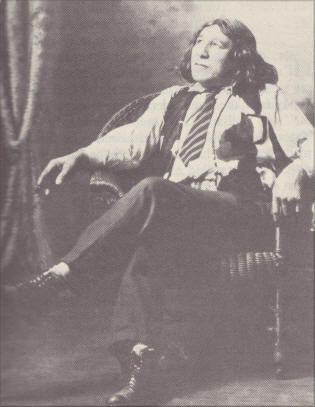
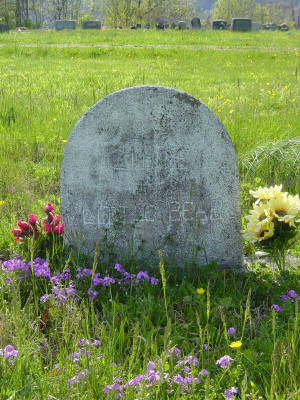
Photos: Left Big Chief posing in his Sunday best.
Source: page 469, "Around Home in Unicoi Co." by William Helton", also
available at ETSU, box #34. Right his
headstone at Martins Creek Cemetery, Erwin, Tennessee taken in the spring
2003 -bbpytel
LIFE SKETCH :
William "Big Chief Little Bear" Harrison claimed to be the nephew of
Sioux Nation Chief, Sitting Bull of Little Bighorn. He was born May 10,
1882, at Standing Rock, Fort Yates, Sioux Co., North Dakota and orphaned
by the age of 4. His parents are unknown; records showed he was "mixed
blood" (bi-racial). The only known relatives were uncles John (age
27) and James (age 21) Brown with which he was noted living (age 14) per
1894 Sioux census of Standing Rock. Although he traveled around the
country, census records enumerated his residence at Standing Rock most
of his life. He struggled with the law often. In 1915, he was arrested
in South Dakota for impersonating a Federal Officer selling land at
Standing Rock and was sentenced to a Federal Prison at Fort Leavenworth,
Kansas. After release from Leavenworth, he went back to South Dakota and
married a white woman and then disappeared with a large sum of money
belonging to her (see newspaper clipping). The law caught up with him
again and in August 1915, he pled guilty to the charge of obtaining
money under false pretense and sentenced to 5 months in a State
Penitentiary at Pierre, South Dakota. In May 1917, he repeated the same
offence impersonating a Federal Officer selling homestead land at
Standing Rock and was sent back to Leavenworth. The newspaper article
stated he served a year in prison in Atlanta, Georgia for the same
offence. The Sioux Nation Census rolls showed that he continued to live
at Standing Rock through 1928, single, and a Trust Fund Settlement
recipient. It's unclear why he left Standing Rock for the eastern part
of Tennessee where he sold "herbal treatments" to the residents of the
tri-cities area. In January 1929, he ran into trouble again with the law
at Dry Hollow in Kingsport, TN and was arrested for being drunk,
shooting firearms, transporting liquor, resisting arrest and carrying
firearms. He was fined $50 for being intoxicated and summoned to appear
in court for the other charges. On February 28, 1929, he was involved in
another altercation in front of the Erwin Hotel on Main Street in Erwin,
Unicoi Co., TN. He was stabbed in the abdomen by a fellow resident,
Ralph Moore, and sent to the Erwin hospital to get stitched up during at
which time he encountered a fight with his physician. Subsequent to the
brawl with the doctor, the police apprehended William and sent him to
jail where he was allegedly beaten by police. Near death, he was
transferred to Johnson City for intensive care where he died shortly
thereafter. His
death certificate did not provide much personal info. It stated age
62*, homicide and died from meningitis caused by being hit by a revolver
by policeman. William was well-liked by many and his sympathizers
collected money to pay for his burial and headstone. He is buried at
Martins Creek Cemetery in Erwin, Tennessee.
SOURCES: Reviewing census records from Standing
Rock, South Dakota, a William Harrison is noted as follows: 1887 age 4
and "orphan"; 1888 age 7, "mixed blood" and "orphan"; 1890 age 14; 1899
age 17, 1900 age 18. Beginning in 1890, he was living in the household
of brothers James and John Brown and noted as "nephew". The most
definitive record was his
WWI registration completed in 1919 in which he declared he was born
on May 2, 1882; lived at Fort Yates, Sioux, ND; Nationality "Indian"; a
laborer at the US Penitentiary at Fort Leavenworth, KS; John Brown was
his nearest relative. Described as tall, medium build, black hair, black
eyes.
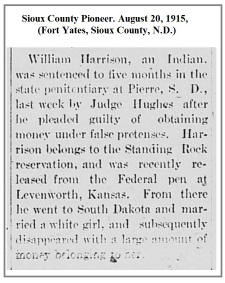
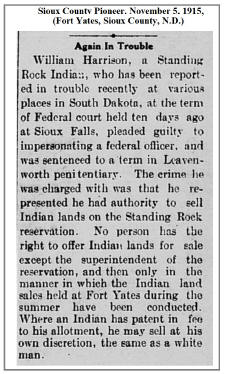
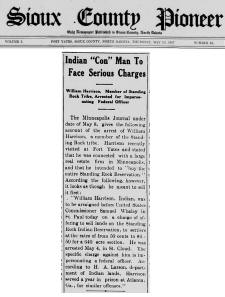 |
|
OPINION:
One cannot
help but think that Prohibition might have played a huge role in the
shenanigans surrounding the death of Big Chief Little Bear – the
“Medicine Man.” His charges in Kingsport were alcohol and firearm
related and his death in Erwin precipitated with a fight between him and
a former marshal, Ralph Moore, both of whom were intoxicated at the
Erwin Hotel after which time he gets arrested and tossed in jail where
he sustained a serious blow to the head and was denied immediate medical
care which could have saved his life. After his death, it was discovered
that the Chief was William Harrison from North Dakota. A Sioux Native
American who traveled around the country extensively and had dealings
with the law to include time in prison.
In 1917,
Tennessee was a totally dry state, two years before the
18th Amendment was ratified on the federal level. On April 9, 1918,
the Erwin Board of Mayor and Alderman (BMA) passed Ordinance No. 68
known as the “Bone Dry Ordinance” which prohibited the shipping and
receiving of alcoholic beverages in its jurisdiction. By the mid 1920s,
Johnson City was known as “Little Chicago” (15 miles north of Erwin) and
harbored a major underground network and supply of alcohol to the
speakeasies of the area with the help of Al Capone and his force. The
railroads facilitated as the major distribution route of distilleries in
the Appalachian to the cities “on the line” to include Erwin, Johnson
City, and Kingsport. Hotels, restaurants, banks and shops were within
walking distance to the RR depots. Although the 18th Amendment did not
prohibit the consumption of alcohol, but rather making it illegal to
manufacture, sale or transport intoxicating liquors, the Tennessee State
Statute of 1917 (coupled with Erwin Ordinance No 68) took it one step
further by making it illegal to receive or possess alcohol.
Marshals were hired to enforce the ordinance. In 1926, there were over
5,000 arrests and citations issued in Johnson City alone (with a
population of about 19,000). Despite the rampant arrests, alcohol flowed
fluidly through the tri-cities area and many people from all social
classes to include police, doctors, preachers, attorneys, bankers,
merchants, and the Mayor knew the underground on how to acquire their
cure.
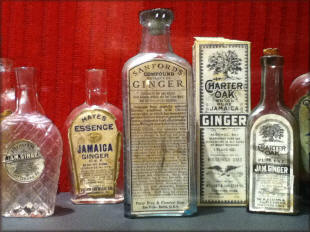 Ironically
the consumption of alcohol was permitted for medicinal or religious
purposes. There were various herbal tonics available which had high
levels of alcohol some as high as 93%.
Jamaica Ginger
“Jake” (infused ginger root in alcohol) was a very popular herbal
tonic for a broad spectrum of ailments. It was cheaper than
Whiskey and could skirt the law with the same effect. So one could only
imagine being a Medicine Man during prohibition could yield healthy
profits. Ironically
the consumption of alcohol was permitted for medicinal or religious
purposes. There were various herbal tonics available which had high
levels of alcohol some as high as 93%.
Jamaica Ginger
“Jake” (infused ginger root in alcohol) was a very popular herbal
tonic for a broad spectrum of ailments. It was cheaper than
Whiskey and could skirt the law with the same effect. So one could only
imagine being a Medicine Man during prohibition could yield healthy
profits.
I am of the
opinion that Big Chief Little Bear was involved somehow in the supply
chain of the bootleg underground. He was educated, well-traveled, fluent
in English, full of confidence (he represented himself in court in
Kingsport) and had cash flow to enable his lodging, mobility and
ventures. Selling medicinal remedies may have included, the tonics or
even a dram in his line of products. I also believe the Erwin Hotel was
a “speakeasy” and the altercation between him and Ralph Moore at the
Hotel was motivated by financial dealings. Despite his sketchy past, the
Chief was a well-liked man, who gained the sympathy of the local people
of the railroad town as evident from the donations collected to pay for
his coffin and funeral and the large turn-out at his service at the
beautiful First Baptist Church with many preachers officiating.
Below are
two newspaper articles from the Kingsport Times outlining the events. I
have also included a summary of the events presented in William W.
Helton’s book “Around Home in Unicoi County which provide additional
details.
|
|
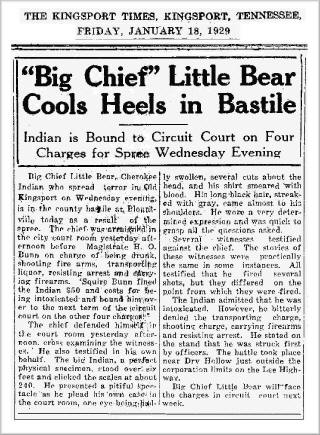 The Kingsport
Times, Kingsport, Tennessee ■ Friday, January 18, 1929 The Kingsport
Times, Kingsport, Tennessee ■ Friday, January 18, 1929
“Big Chief” Little Bear Cools Heels in Bastile
Indian is Bound to Circuit Court for Four Charges of
Spree Wednesday Evening"
"Big Chief
Little Bear, Cherokee Indian who spread terror in Old Kingsport on
Wednesday evening, is in the county bastile at Blountville today as a
result of the spree. The chief was arraigned in the city court room
yesterday afternoon before Magistrate H. O. Bunn on charges of being
drunk, shooting fire arms, transporting liquor, resisting arrest and
carrying firearms. “Squire Bunn fined the Indian $50 and costs for being
intoxicated and bound him over to the next term of circuit court on the
other four charges.”
The chief
defended himself in the court room yesterday afternoon, cross examining
the witnesses. He also testified on his own behalf. The Big Indian, a
perfect physical specimen, stood over six feet and clicked the scales at
about 240. He presented a pitiful spectacle as he plead his own case in
the court room, one eye being badly swollen, several cuts about the
head, and his shirt smeared with blood. His long black hair, streaked
with gray, came almost to his shoulders. He wore a very determined
expression and was quick to grasp all the questions asked.
Several
witnesses testified against the chief. The stories of the witnesses were
practically the same in some instances. All testified that he fired
several shots, but they differed on the point from which they were
fired.
The Indian
admitted that he was intoxicated. However, he bitterly denied the
transporting charge, shooting charge, carrying firearms and resisting
arrest. He stated on the stand that he was struck first by officers. The
battle took place near Dry Hollow just outside the corporation limits on
the Lee Highway.
Big Chief
Little Bear will face the charges in circuit court next week."
|
|
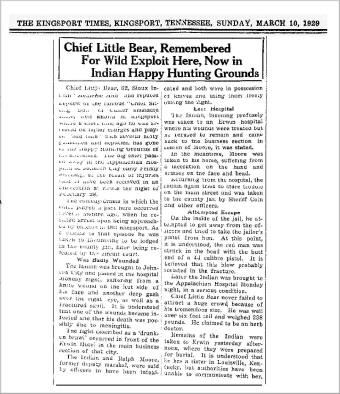 The Kingsport Times,
Kingsport, Tennessee ■ Sunday, March 10, 1929 The Kingsport Times,
Kingsport, Tennessee ■ Sunday, March 10, 1929
"Chief Little Bear,
Remembered For Wild Exploit Here, Now in Indian Happy Hunting Grounds"
"Chief Little Bear, 62,
Sioux Indian, medicine man and reputed nephew of the famous “Chief
Sitting Bull” of Custer massacre fame, was known in Kingsport where a
short time ago he was arrested on liquor charges and played “bad droll”
with several hefty policemen and deputies, has gone to the happy hunting
groups of his ancestors. The Big Chief passed away in the Appalachian
Hospital of Johnson City early Friday bleeding as a result of injuries
that to have been received in an altercation at Erwin the night of
February 28.
The comedy-drama in which
the chief played a part here occurred several months ago, when he
resisted arrest upon being approached by police in Old Kingsport. As a
result to that episode, he was taken to Blountville to be lodged in the
county jail, later being released by the circuit court.
Was Badly Wounded
The Indian was brought to Johnson City and placed in the hospital Monday
night, suffering from a knife wound on the left side of his face and
another deep gash over the right eye, as well as a fractured skull. It
is understood that one of the wounds became infected and that his death
was possibly due to meningitis.
The night described as a ‘drunken brawl’ occurred in front of the Erwin
Hotel in the main business section of the city. The Indian and Ralph Moore, former deputy marshal, were said by officers
to have been intoxicated and both were in possession of knives and using
them freely during fight.
Left Hospital
The Indian, bleeding profusely was taken to an Erwin hospital where his
wounds were treated but he refused to remain and came back to the
business section in search of Moore, it was states. In the meantime, Moore was taken to his home, suffering from a
laceration on the hand and bruises on face and head. Returning from the hospital, the Indian again tried to start trouble on
the main street and was taken to the county jail by Sheriff Coin and
others.
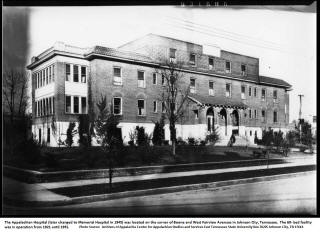 Attempted Escape Attempted Escape
On the inside of the jail, he attempted to get away from the officer and
tried to take the jailor’s pistol from him. At this point, it is
understood, the red man was struck in the head with the butt end of a 44 calibre pistol. It is believed that his blow probably resulted in the
fracture.
Later the Indian was brought to the Appalachian Hospital Monday night in
a serious condition.
Chief Little Bear never failed to attract a huge crowd because of his
tremendous size. He was well over six feet tall and weighed 238 pounds.
He claimed to be an herb doctor.
Remains of the Indian were taken to Erwin yesterday afternoon, where
they were prepared for burial. It is understood that he has a sister in
Louisville, Kentucky, but authorities have been unable to communicate
with her."
|
|
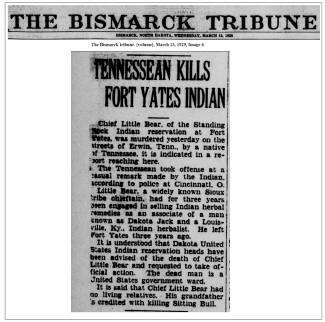 The
Bismark Tribune, Bismark, North Dakota. ■ Wednesday, March 13, 1929. The
Bismark Tribune, Bismark, North Dakota. ■ Wednesday, March 13, 1929.
"Tennessean Kills Fort Yates Indian"
"Chief Little Bear of
Standing Rock Indian reservation at Fort Yates was murdered yesterday on
the Streets of Erwin, Tenn., by a native of Tennessee, it is indicated
in a report reaching here.
The Tennessean took
offense at the casual remark made by the Indian, according to police at
Cincinnati, O.
Little Bear, a widely
known Sioux tribe chieftain, had for 3 years be engaged in selling
Indian herbal remedies as an associate of a man known as Dakota Jack and
a Louisville, Kentucky Indian herbalist. He left Fort Yates three
years ago.
It is understood that
Dakota United States Indian reservation heads have been advised of the
death of Chief Little Bear and requested to take official action.
The dead man is a United States government ward.
It is said that Chief
Little Bear had no living relatives. His grandfather is credited
with Sitting Bull."
|
|
Below are
paraphrased highlights and direct quotes from William W. Helton’s book
“Around Home in Unicoi County” pgs. 469 and 470 regarding Chief Little
Bear.
Big Chief
Little Bear (aka William Harrison per the Bureau of Indian Affairs)
claimed to be the nephew of
Chief Sitting Bull.
He was
a large, affable traveling salesman who took up residence at the Erwin
Hotel located on the south end of Erwin on Main Street. He sold herbal
remedies to the local folks and was known as the “Medicine Man”. He was
also popular with the children telling them stories and showing them how
to make bows and arrows. According to Helton’s book, the recount of the
incident that killed Little Bear goes like this.
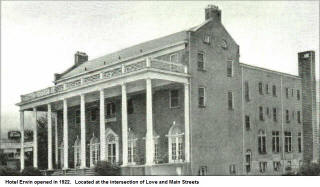 “Little
Bear was entering the hotel (where he was living) when he was attacked by a knife wielding
assailant who slashed him across the stomach. A doctor sewed up the
wound, but the stitches came loose requiring treatment at a hospital.
But before he received treatment, a doctor in the emergency room made
insulting remarks to the chief angering him so he left in pain and a
daze. He was in that condition when picked up on the street and hauled
off to jail. He resisted police at the jail house and was “bashed in the
head by a pistol butt, crushing his skull. After falling to the floor
unconscious, the officers turned a water hose on him and left him
unattended.” He was taken to Johnson City Hospital where he died shortly
upon arrival from his injuries. “Little
Bear was entering the hotel (where he was living) when he was attacked by a knife wielding
assailant who slashed him across the stomach. A doctor sewed up the
wound, but the stitches came loose requiring treatment at a hospital.
But before he received treatment, a doctor in the emergency room made
insulting remarks to the chief angering him so he left in pain and a
daze. He was in that condition when picked up on the street and hauled
off to jail. He resisted police at the jail house and was “bashed in the
head by a pistol butt, crushing his skull. After falling to the floor
unconscious, the officers turned a water hose on him and left him
unattended.” He was taken to Johnson City Hospital where he died shortly
upon arrival from his injuries.
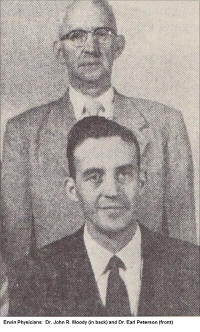 The body
was sent back to Erwin and held at the morgue until proper
identification was rendered to determine which reservation he belonged
to. Dr. John R. Moody (pictured left) was the attending physician in Erwin who completed his
death certificate and wrote to the Department of Interior. The
agency responded
explaining that “Chief Little Bear” was William Harrison from Standing
Rock Agency, Fort Yates, North Dakota who left the Sioux reservation
many years ago. He traveled extensively from the Dakotas down to the
Mexico territory through the southeastern part of the United States.
Through his travels he was in trouble with the law and served a
time in prison. The body
was sent back to Erwin and held at the morgue until proper
identification was rendered to determine which reservation he belonged
to. Dr. John R. Moody (pictured left) was the attending physician in Erwin who completed his
death certificate and wrote to the Department of Interior. The
agency responded
explaining that “Chief Little Bear” was William Harrison from Standing
Rock Agency, Fort Yates, North Dakota who left the Sioux reservation
many years ago. He traveled extensively from the Dakotas down to the
Mexico territory through the southeastern part of the United States.
Through his travels he was in trouble with the law and served a
time in prison.
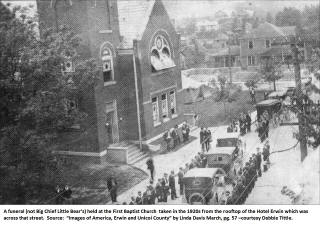 A group of
Clinchfield railroad merchants, to include George Miller, rallied
support to see that Little Bear was given a proper burial. Locals of
Erwin took up a collection to pay for a casket and the preparation of
the grave at
Martins Creek Cemetery. Scores of local town’s people
attended the funeral service on March 14, 1929, held at the First
Baptist Church in Erwin with the following ministers in attendance and
officiating: Rev. J.C. Reynolds, Rev. S. H. Austin, Rev. James C.
Sherwood, Rev. W. H. Wright, and Rev. R. O. Franklin. The service
concluded with a popular folksong “Red Wing” written in 1907 about a
young Indian girl's loss of her sweetheart who died in battle, after
which time his body was laid to rest and his spirit soared away to the
heavens. A group of
Clinchfield railroad merchants, to include George Miller, rallied
support to see that Little Bear was given a proper burial. Locals of
Erwin took up a collection to pay for a casket and the preparation of
the grave at
Martins Creek Cemetery. Scores of local town’s people
attended the funeral service on March 14, 1929, held at the First
Baptist Church in Erwin with the following ministers in attendance and
officiating: Rev. J.C. Reynolds, Rev. S. H. Austin, Rev. James C.
Sherwood, Rev. W. H. Wright, and Rev. R. O. Franklin. The service
concluded with a popular folksong “Red Wing” written in 1907 about a
young Indian girl's loss of her sweetheart who died in battle, after
which time his body was laid to rest and his spirit soared away to the
heavens.
|
|
RED WING
Written in 1907 lyrics by Thurland
Chattaway, music by Kerry Mills.
"There once lived an Indian maid,
A shy little prairie maid,
Who sang all day a love song gay,
As on the plains she'd while away
the day.
She loved a warrior bold,
This shy little maid of old,
But brave and gay he rode one day
To battle far away.
Now the moon shines tonight on
pretty Red Wing,
The breeze is sighing, the night
bird's crying,
For afar 'neath his star her brave
is sleeping.
While Red Wing's weeping her heart
away."
|
|
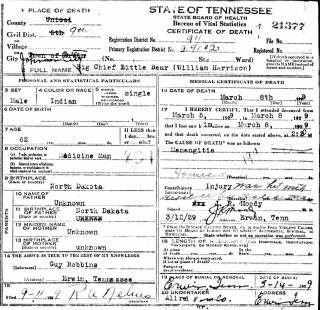 TENN
DEATH CERT #21377:
William Harrison / Big Chief Little Bear was single from North
Dakota, parents unknown and his occupation was “Medicine Man.”
He died age 62 at 2:30 a.m. on Friday, March 8, 1929; cause of
death “meningitis” due to being “hit with revolver by policeman”
He
was buried on 3/14/1929.
Dr.
John Roy Moody was the attending physician. TENN
DEATH CERT #21377:
William Harrison / Big Chief Little Bear was single from North
Dakota, parents unknown and his occupation was “Medicine Man.”
He died age 62 at 2:30 a.m. on Friday, March 8, 1929; cause of
death “meningitis” due to being “hit with revolver by policeman”
He
was buried on 3/14/1929.
Dr.
John Roy Moody was the attending physician.
|
|
|
|
|
HOME
|
|
|
|

|
 2007-Present All Rights Reserved. The information contained herein
is the property of the individual submitters. For information about how
to become a TNGenWeb County Host, please visit our guidelines page at
http://www.tngenweb.org/adoptco/.
2007-Present All Rights Reserved. The information contained herein
is the property of the individual submitters. For information about how
to become a TNGenWeb County Host, please visit our guidelines page at
http://www.tngenweb.org/adoptco/.
Unicoi Co. webmaster: Beth
Bradford-Pytel
|
|